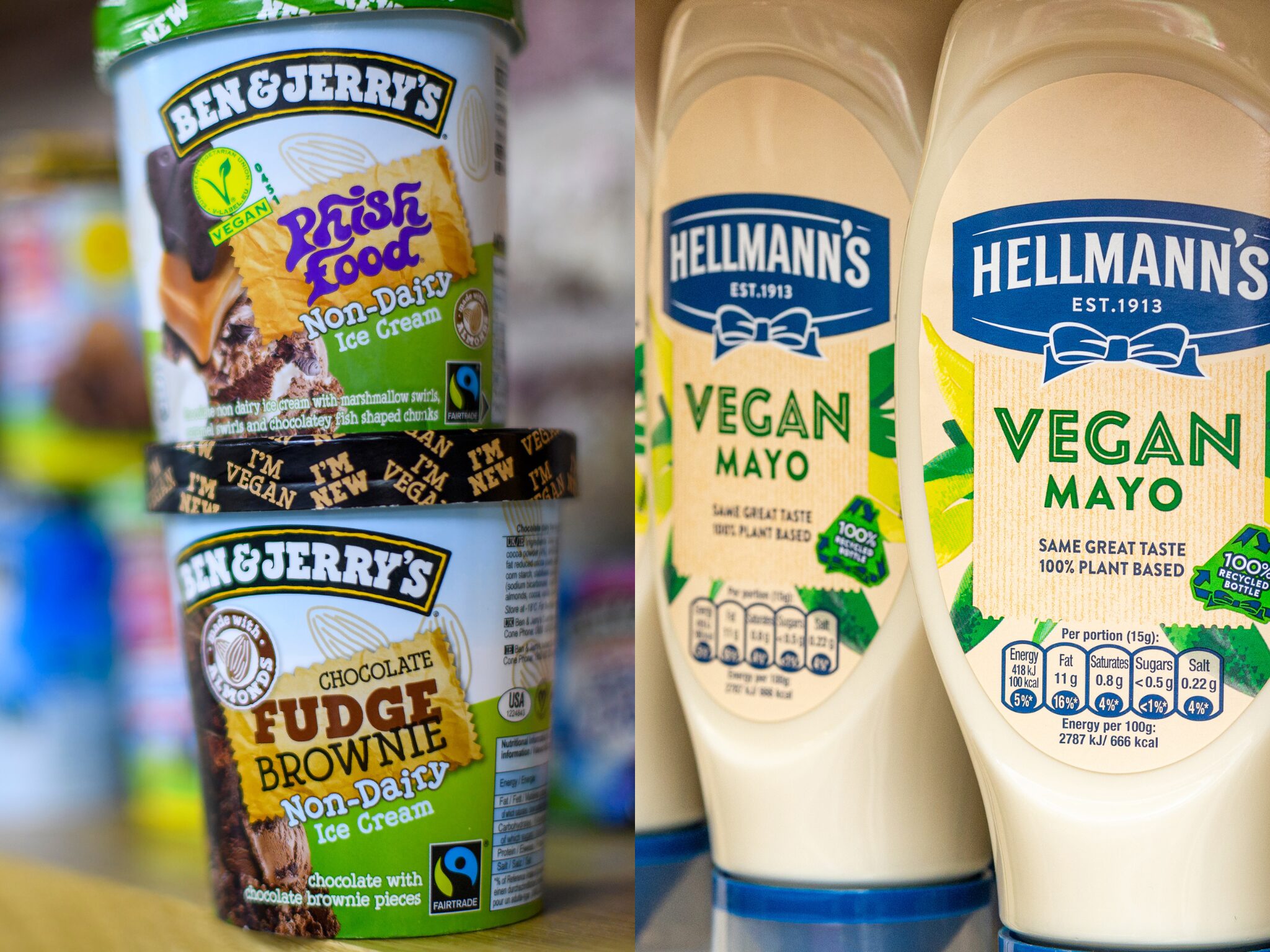Unilever Targets €1.5B in GLP-1 Boosting Plant-Based Food Sales by 2025 to Help Consumers Boost Gut Health
5 Mins Read
Can our bodies help us create a natural Ozempic effect through vegan food consumption? Unilever is banking on plant-based diets to enhance the gut microbiome and boost consumers’ health.
With Ozempic and Wegovy dominating conversations about health over the last year – equally for their weight loss abilities and associated side effects – some TikTokers took to the naturally-occurring compound berberine, hailing it as “nature’s Ozempic”.
But it turns out there might be a natural version of these GLP-1 agonist semaglutide drugs: our gut. Specifically, incretin hormones, which can be regulated with nutrients like dietary fibre and foods that are fermented. Many plant-based foods are rich in fibre and polyunsaturated fats (PUFAs), which are key to feeding the gut microbes that produce incretin hormones – and it’s these products that one of the world’s largest food companies is banking on to improve consumer health.
By next year, Unilever is hoping to reach €1.5B ($1.61B) in annual sales from plant-based products in categories that would have traditionally used animal-derived ingredients. Further, the company says it plans to double the number of products that include meaningful amounts of healthy ingredients such as vegetables and fruits. The goal is to make these products represent 54% of its total portfolio – by 2022, this figure had already reached 48%.
Explaining the move, Unilever’s global health director Julie Willems highlighted the health benefits of a plant-based diet. “Firstly, it’s typically lower in calories and saturated fat and higher in fibre and unsaturated fats. Secondly, it can reduce the risk of disease,” she said.
“Different studies have shown that plant-based diets can prevent diseases by improving glycaemic control, and reduce the risk of type 2 diabetes and being overweight. There are also strong scientific indications that plant-based diets are generally associated with a reduced risk of developing cardiovascular diseases, overall cancer incidence and/or mortality.”
How plant-based foods can trigger our bodies’ natural Ozempic
Research published in the peer-reviewed MDPI journal Nutrients last year revealed that plant-based diets could be the key to a healthy gut microbiome. As Christopher Damman, a professor of gastroenterologist at the University of Washington, notes: “Specialised bacteria in your lower gut take the components of food you can’t digest, like fibre and polyphenols… and turns them into molecules that stimulate hormones to control your appetite and metabolism. These include GLP-1, a natural version of Wegovy and Ozempic.”
Damman explains that modern food processing can remove bioactive molecules such as fibre and polyphenols, which help regulate metabolism and appetite. Drugs like Wegovy, Ozempic and Mounjaro use GLP-1 (plus, in the latter’s case, GIP) hormone analogues to promote weight loss and blood glucose control – but these incretin-based therapies are also linked to gastrointestinal side-effects like nausea, vomiting, diarrhoea and constipation, with more severe (but rarer) impacts including serious digestive issues like stomach paralysis, pancreatitis, and bowel obstructions.
This is where plant-based foods come in, which are adept at providing the nutrients needed to support a wider diversity of helpful gut microbes, according to Simone Pyle, Unilever’s science and tech manager for the gut microbiome.
“Over half of the microbes in our gut can be altered by what we eat, so the trick is to ‘feed’ the beneficial ones that are critical to maintaining good health,” she said. “These ‘good’ microbes become influential, improving the microbiome’s composition in a matter of weeks or even days.”
Citizen science programme the American Gut Project has found that people who eat over 30 different plant-based foods a week have a more diverse – and thus healthier – microbiome than those who eat 10 or fewer. Robert Dixon, who co-leads the science and tech team at Unilever, suggests that one of the best ways of maintaining microbiome diversity is to “eat a wide range of fruit and vegetables”. This means more fibre with beans and legumes, more prebiotics with fruits like berries, and more gut microbes with fermented vegetables.
Unilever’s own research reviews of adult and child/adolescent eating patterns reveal that general vegan diets are higher in fibre, PUFAs, folate, vitamins C and E, and magnesium than meat-based diets. But across all dietary categories, people were still not eating a wide enough variety of foods to get all the nutrients they needed.
Unilever’s plant-based push for gut health

The CPG giant’s research projects are thus finding ways to improve its plant-based portfolio, with the target of selling double the number of products that “include meaningful amounts of healthy ingredients such as vegetables and fruits”, explained Pyle. Some of its brands making vegan products include Knorr, Hellmann’s, The Vegetarian Butcher, Ben & Jerry’s, and Magnum.
In the ethical investor network FAIRR’s database of companies investing in plant-based product development, Unilever topped the list for two consecutive years (including the latest one in 2022), indicating its position as the leader among companies using protein diversification to drive growth and build climate-friendly portfolios.
With a market cap of over $120B, the company’s products are used by 3.4 billion people every day. It plans to use its reach to amp up its vegan offerings and support its Positive Nutrition strategy. “Our new Knorr dehydrated vegetable range in Argentina, for example, is made from 100% spinach, onions, bell peppers and carrots. The products take only three minutes to hydrate, can be used in all sorts of cooking and have a long shelf life, making them a great way to avoid waste,” said Pyle.
“Our Knorr vegetable soups are another example, delivering more than half of the daily amount of the fruit and vegetables recommended by the World Health Organization,” she added.
The company is also encouraging increased adoption of plant-based foods, especially produce consumption. Last year, a 32,000-person international poll revealed that 75% of respondents don’t think they’re eating the daily recommended amount of fruits and vegetables, with 23% saying they eat the suggested portions less than once a week.
Similarly, over 45% of Dutch consumers don’t eat vegetables every day. “To address this, we reformulated our Knorr meal kits and changed our back-of-pack recipes for alternatives that required adding more vegetables and less meat without compromising on taste,” said Pyle. “Based on consumer data after the launch, we estimate that we have increased Dutch vegetable consumption by around three million kg per year.”
Pyle cited a global DSM study from last year, which suggested that 73% of consumers recognise the link between good gut health and overall wellness. “As the conversation around gut health grows, I see Unilever continuing to incorporate scientific insights into food innovations that can help make plant-based eating an appetising option for our consumers,” she said.
Can Unilever cash in on our “natural Ozempics” with plant-based diets?



